Which airline credit card is best for long term spending?
Links on Head for Points may support the site by paying a commission. See here for all partner links.
Many of the credit card articles on Head for Points are focused on sign-up bonuses. Get a card, spend the minimum required to trigger the bonus and potentially move on.
However, if you are a medium to high spender, the few thousand pounds of card spend required each year to hit your sign-up bonus targets is not a stretch.
You need to consider where to put the rest of your annual spend. This article can help you.
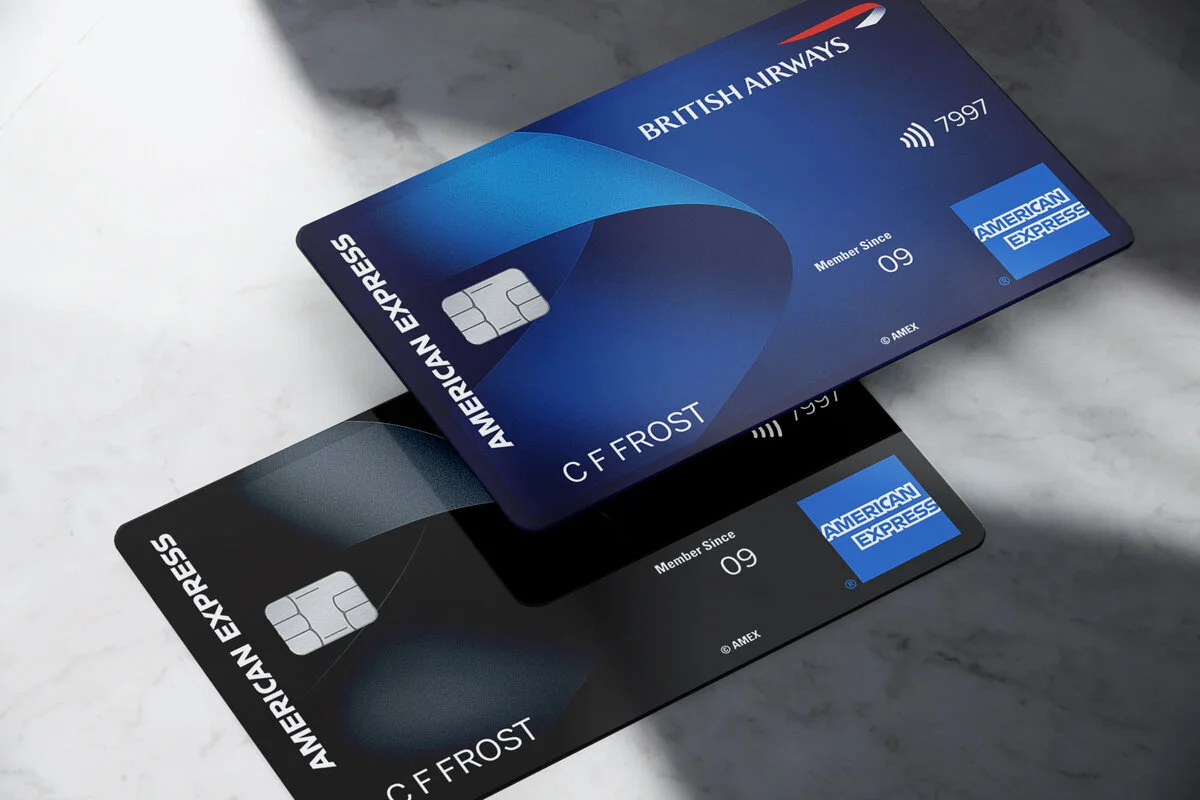
It’s a long one, but the overall summary is:
- the Virgin Atlantic Reward Mastercards are probably better than you think, especially if you have Virgin Flying Club status
- the Barclaycard Avios Mastercards are probably worse than you think but are mainly used as a back-up card anyway
- the British Airways American Express Premium Plus Card remains the best option overall
To keep it simple, this article ONLY looks at the value you get when redeeming credit card vouchers in Business Class.
This allows us to cut all of the discussion about the free British Airways American Express Credit Card, because the Companion Voucher on that card is only valid for Economy flights.
If you are not interested in redeeming your Avios or Virgin Points for Business Class, this article won’t help you – although you can use our methodology to run similar calculations for Premium Economy or Economy.
All of the calculations are based on flying Business Class / Upper Class to San Francisco. The conclusions may vary on other routes.
A caveat about Virgin Atlantic
Our Virgin Atlantic analysis is based on ‘Saver’ seat availability in Upper Class.
Under the new dynamic pricing system for reward flights, these seats are few and far between on most routes except for the US East Coast and India. On some routes there are effectively zero ‘Saver’ seats released for the entire year. Without a ‘Saver’ seat you can expect to pay up to 700,000 Virgin Points for your second seat, and you’re not that stupid.
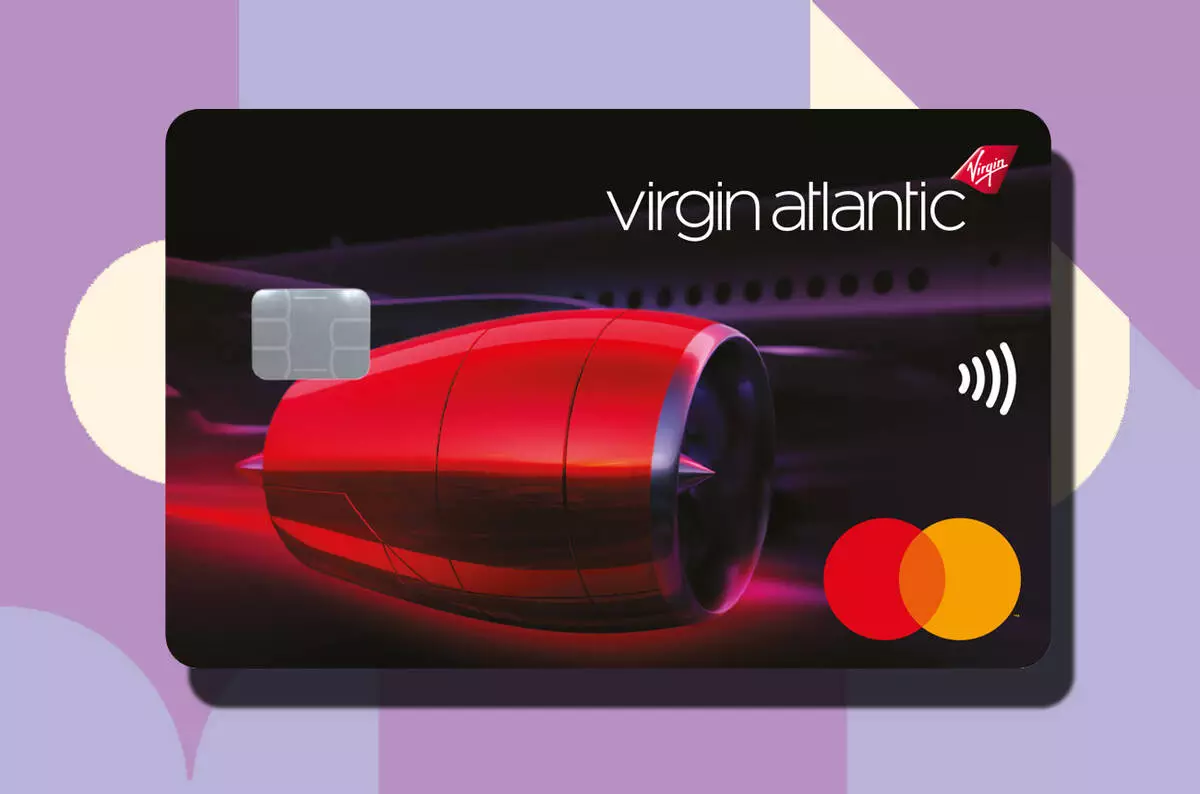
Part 1 – Travelling as a couple
We do not consider the Barclaycard Avios Mastercard cards in this section. The annual voucher can upgrade one return ticket or two one-way tickets, which means that you should use the numbers in the ‘Travelling solo’ section in Part 2 even if two are travelling.
Our ‘Excellent’ choices for long-term spending:
Virgin Atlantic Reward+ Mastercard – if you have elite status
Spend £10,000 on the Virgin Atlantic Reward+ Mastercard card and you receive a voucher, valid for two years, worth 150,000 Virgin Points.
You must have Silver or Gold status in Virgin Flying Club for your voucher to be worth 150,000 points. Red members (status is based on the day you book) only get a voucher worth 75,000 points.
For a couple, it can be used to book a ticket for your companion when you book a cash or reward ticket for yourself.
You can top up the voucher if the companion ticket costs more than 150,000 Virgin Points.
For San Francisco in Upper Class (which is the example used throughout this article) the companion ‘Saver’ ticket would cost no more than 155,000 points return. Remember our caveats above about the difficulty of finding such seats, however ….
Based on a valuation of 1p per Virgin Point and finding a ‘Saver’ seat worth 155,000 Virgin Points:
- the companion voucher is ‘worth’ £1,500 (150,000 Virgin Points saving x 1p) and
- you also earn 15,000 base Virgin Points for spending £10,000 on your Reward+ Mastercard to trigger the voucher (worth £150 @ 1p) but
- the card fee is £160
The net benefit for a Silver or Gold member spending £10,000 on the Virgin Atlantic Reward+ Mastercard = £1,490 (£1,500 + £150 – £160) or 14.9% of spend.
Our full review of the Virgin Atlantic Reward Plus Mastercard is here. You can apply here.
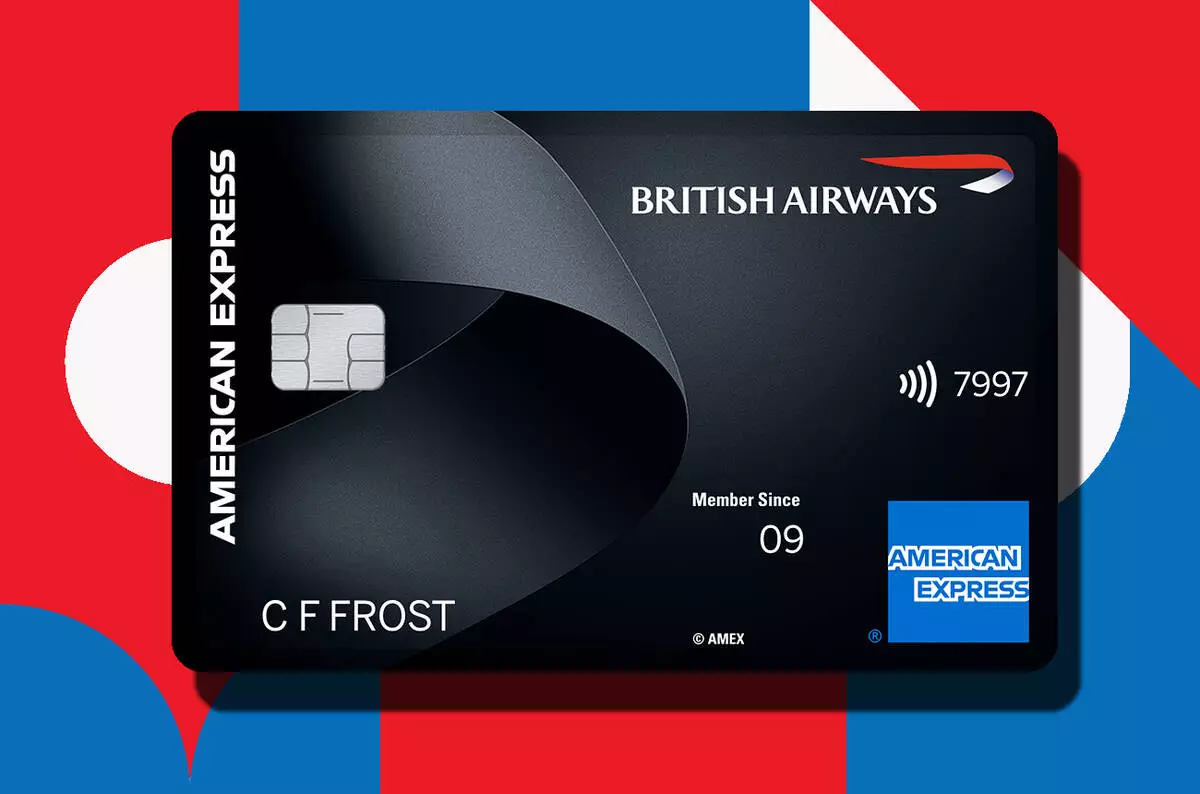
British Airways American Express Premium Plus Card
Spend £15,000 on this card in a membership year and you get a Companion Voucher which gives you two Avios redemption tickets on BA, Iberia or Aer Lingus for the points of one.
The Companion Voucher also allows a solo traveller to book a return ticket for a 50% Avios discount – we look at this option later.
On a typical redemption (two Club World tickets to San Francisco on a peak day), this saves you 200,000 Avios points when you use the ‘most Avios, least cash’ booking option.
If you value an Avios at 1p:
- the 2-4-1 Companion Voucher is ‘worth’ £2,000 (200,000 Avios saving x 1p) and
- you also earn 22,500 base Avios for spending £15,000 to trigger the voucher (worth £225 @ 1p) but
- you pay an annual fee of £300
The net benefit for spending £15,000 on the British Airways American Express Premium Plus Card = £1,925 (£2,000 + £225 – £300) or 12.8% of your card spend.
Our full review of the British Airways American Express Premium Plus Card is here. You can apply here.
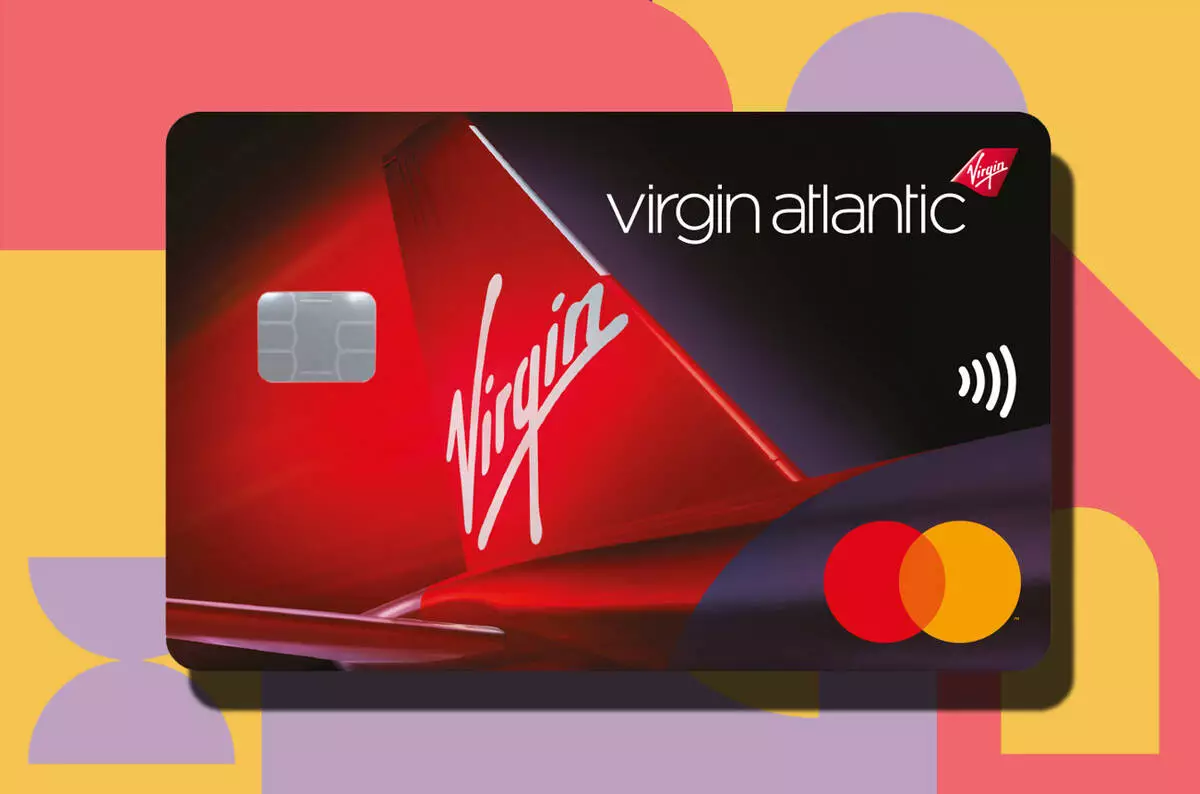
Our ‘Very Good’ choices for long-term spending:
Virgin Atlantic Reward Mastercard (free) – if you have elite status
The vouchers on both Virgin Atlantic credit cards are identical – both are valid for two years and both are valid in all travel classes. The only difference is that the free card requires £20,000 of spending to trigger it.
This is how the maths goes, based on two people flying to San Francisco in Upper Class (booking the second person in a 155,000 points ‘Saver’ seat) and holding Silver or Gold status in Virgin Flying Club.
Based on valuation of 1p per Virgin Point, to match our Avios valuation:
- the 2-4-1 voucher is ‘worth’ £1,500 (150,000 Virgin Points saving x 1p) and
- you also earn 15,000 base Virgin Points for spending £20,000 to trigger the voucher (worth £150 @ 1p) and
- the card fee is £0
The net benefit for a Silver or Gold member spending £20,000 on the Virgin Atlantic Reward Mastercard = £1,650 (£1,500 + £150) or 8.25% of spend.
Our full review of the free Virgin Atlantic Reward Mastercard is here. You can apply here.
Virgin Atlantic Reward+ Mastercard – if you do NOT have elite status
A ‘no status’ Red member of Virgin Flying Club will only receive an annual voucher worth 75,000 Virgin Points.
Using our San Francisco Upper Class example, the 2nd ticket will require to pay 80,000 Virgin Points. This is based the ticket costing 155,000 Virgin Points and the voucher saving you 75,000.
This means:
- the 2-4-1 voucher is ‘worth’ £750 (75,000 Virgin Points saving x 1p) and
- you also earn 15,000 base Virgin Points for spending £10,000 to trigger the voucher (worth £150 @ 1p) but
- the card fee is £160
The net benefit for spending £10,000 on the Virgin Atlantic Reward+ Mastercard = £740 (£750 + £150 – £160) or 7.4% of spend.
Our full review of the Virgin Atlantic Reward Plus Mastercard is here. You can apply here.
Our ‘Good’ choices for long-term spending:
Virgin Atlantic Reward Mastercard (free) – if you do NOT have elite status
A ‘no status’ Red member of Virgin Flying Club will only receive an annual voucher worth 75,000 Virgin Points.
Using our San Francisco Upper Class example, the 2nd ticket will require to pay 80,000 Virgin Points. This is based the ticket costing 155,000 Virgin Points and the voucher saving you 75,000.
This means:
- the 2-4-1 voucher is ‘worth’ £750 (75,000 Virgin Points saving x 1p) and
- you also earn 15,000 base Virgin Points for spending £20,000 to trigger the voucher (worth £150 @ 1p)
- the card fee is £0
The net benefit for spending £20,000 on the free Virgin Atlantic Reward Mastercard = £900 (£750 + £150) or 4.5% of spend.
Our full review of the free Virgin Atlantic Reward Mastercard is here. You can apply here.
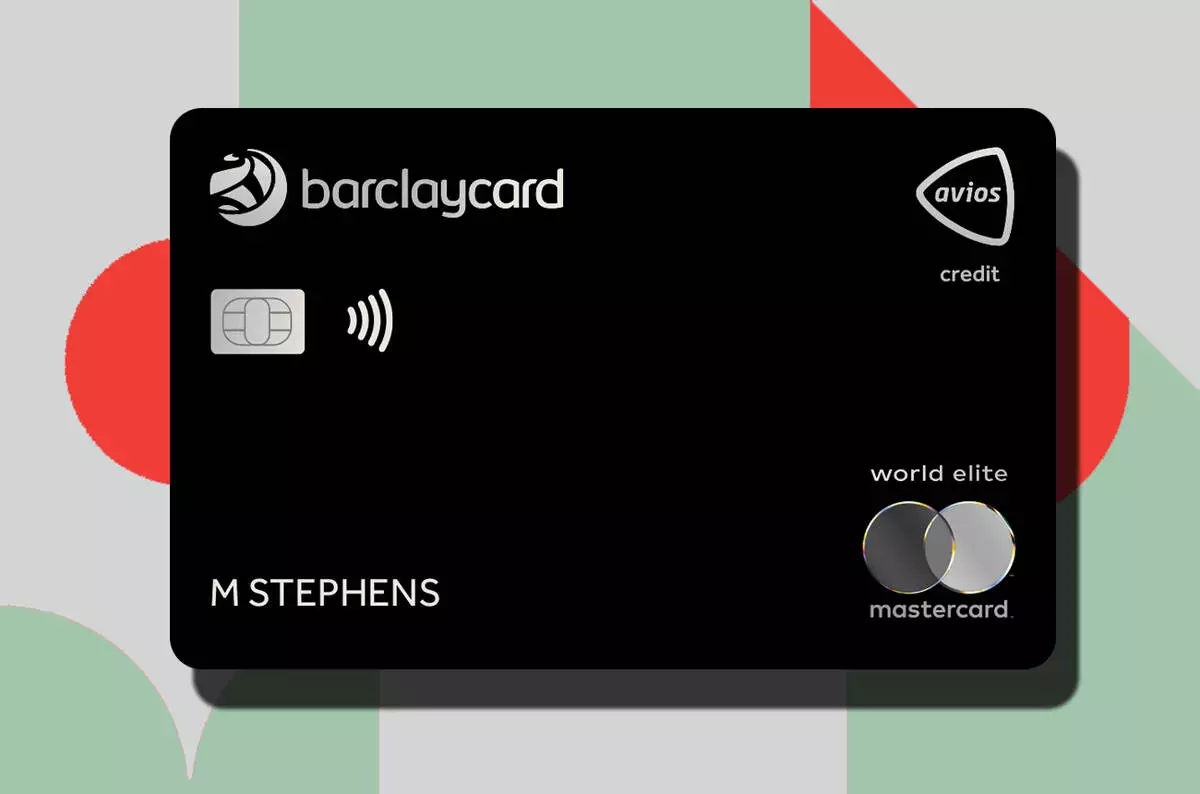
Part 2 – Travelling solo
Because the solo traveller deals are worse than those offered to a couple, none of the options below are rated as ‘Excellent’, which we define as offering a 10%+ return on your card spend.
Our ‘Very Good’ choices for long-term spending:
Virgin Atlantic Reward+ Mastercard
Spend £10,000 on the Virgin Atlantic Reward+ Mastercard card and you receive a voucher, valid for two years, worth 150,000 Virgin Points.
You must have Silver or Gold status in Virgin Flying Club for your voucher to be worth 150,000 points. Red members (status is based on the day you book) only get a voucher worth 75,000 points.
If you are travelling solo, there is an important point to note: you cannot use your voucher for a discount of 75,000 or 150,000 Virgin Points on a ticket for yourself.
That would be too simple ….
Instead, to fly in Upper Class, you need to:
- book a cash ticket in Premium and use points (offset by the voucher) to upgrade it
- book a reward ticket in Premium and use points (offset by the voucher) to upgrade it – your voucher only discounts the upgrade element
If you book a ticket for cash, the base points cost is assumed to be the ‘Saver’ price of a ticket on that route. For example, a Premium ‘Saver’ ticket to San Francisco, peak date, is 75,000 Virgin Points return. If an Upper Class tickets costs 155,000 points, the upgrade will cost 80,000 points.
If you book a ticket for points, the base cost is what you actually paid. If you pay 100,000 Virgin Points to book a Premium seat and an Upper Class seat costs 155,000 points, the upgrade is 55,000 points.
Using ‘Saver’ prices as an example, you’d be looking at 75,000 points for Premium and 155,000 points for Upper Class.
I should stress, however, that finding a date to San Francisco with both Premium and Upper Class ‘Saver’ seats will be, erm, challenging.
Based on a valuation of 1p per Virgin Point:
- your voucher is ‘worth’ £750 to £800 (the cap of 75,000 Virgin Points if you have no status, 80,000 Virgin Points if you do, saving x 1p) and
- you also earn 15,000 base Virgin Points for spending £10,000 to trigger the voucher (worth £150 @ 1p) but
- the card fee is £160
The net benefit for spending £10,000 on the Virgin Atlantic Reward+ Mastercard = £740 or £790 (£750 or £800 + £150 – £160) or 7.4% (if you don’t have status) or 7.9% of spend (if you do have status).
Our full review of the Virgin Atlantic Reward Plus Mastercard is here. You can apply here.
Our ‘Good’ choices for long-term spending:
British Airways American Express Premium Plus Card
Spend £15,000 on this card in a membership year and you can book an Avios redemption for one person at a 50% discount. You can fly on British Airways, Aer Lingus or Iberia.
On a typical redemption (a Club World ticket to San Francisco on a peak day), this saves you 100,000 Avios points when you use the ‘most Avios, least cash’ booking option.
If you value an Avios at 1p:
- the 2-4-1 Companion Voucher is ‘worth’ £1,000 (100,000 Avios saving x 1p) and
- you also earn 22,500 base Avios for spending £15,000 to trigger the voucher (worth £225 @ 1p) but
- you pay an annual fee of £300
The net benefit for spending £15,000 on the British Airways American Express Premium Plus Card = £925 (£1,000 + £225 – £300) or 6.2% of your card spend.
Our full review of the British Airways American Express Premium Plus Card is here. You can apply here.
Barclaycard Avios Plus Mastercard
Spend £10,000 on the Barclaycard Avios Plus Mastercard in a membership year and you receive an Avios upgrade voucher.
This allows you to either:
- book a return Avios flight for one person, paying the Avios required for the next cheapest cabin (so World Traveller Plus if booking Club World, or World Traveller if booking World Traveller Plus)
- book two x one-way flights for two people, on the same terms as above
A return Club World business class flight to San Francisco on a peak day requires 200,000 Avios. A return World Traveller Plus ticket is 135,000 Avios. The upgrade voucher saves you 65,000 Avios when you book into Club World.
Based on a valuation of 1p per Avios:
- the upgrade voucher is ‘worth’ £650 (65,000 Avios saving x 1p) and
- you also earn 15,000 base Avios for spending £10,000 to trigger the voucher (worth £150 @ 1p) but
- the card fee is £20 per month, so £240 for a year
The net benefit for spending £10,000 on the Barclaycard Avios Plus Mastercard = £560 (£650 + £150 – £240) or 5.6% of spend.
Our full review of the Barclaycard Avios Plus Mastercard is here. You can apply here.
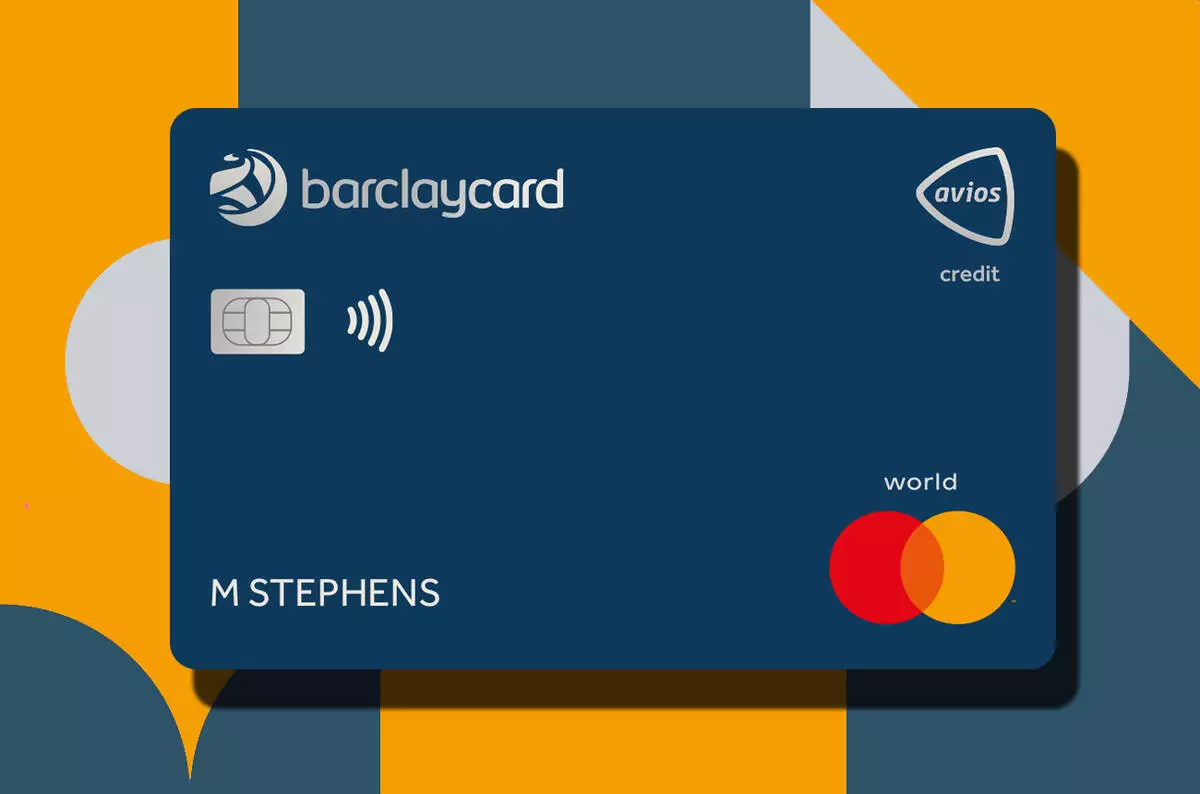
Virgin Atlantic Reward Mastercard (free)
A ‘Saver’ return Upper Class flight to San Francisco is no more than 155,000 Virgin Points on a peak date. A return Premium ‘Saver’ ticket is 75,000 Virgin Points – this is also the assume base cost if you choose to upgrade a cash Premium ticket.
The section above on the Reward+ card explains the methodology in more detail.
Based on a valuation of 1p per Virgin Point:
- your voucher is ‘worth’ £750 to £800 (the cap of 75,000 Virgin Points if you have no status, 80,000 Virgin Points if you do, saving x 1p) and
- you also earn 15,000 base Virgin Points for spending £20,000 to trigger the voucher (worth £150 @ 1p) and
- the card fee is £0
The net benefit for spending £20,000 on the free Virgin Atlantic Reward Mastercard = £900 or £950 depending on whether you have status or not (£750 or £800 + £150) or 4.5% or 4.75% of spend.
Our full review of the free Virgin Atlantic Reward Mastercard is here. You can apply here.
Barclaycard Avios Mastercard (free)
Spend £20,000 on this card in a membership year and you receive an Avios upgrade voucher.
Note that the vouchers on both Barclaycard Avios credit cards are identical – both are valid for two years and both are valid in the same travel classes, with First Class excluded.
Using the same example as above, a return Club World business class flight to San Francisco on a peak day requires 200,000 Avios. A return World Traveller Plus ticket is 135,000 Avios. The upgrade voucher saves you 65,000 Avios when upgrading to Club World.
Based on a valuation of 1p per Avios:
- the upgrade voucher is ‘worth’ £650 (65,000 Avios saving x 1p) and
- you also earn 20,000 base Avios for spending £20,000 to trigger the voucher (worth £200 @ 1p) and
- the card is free
The net benefit for spending £20,000 on the free Barclaycard Avios Mastercard = £850 (£650 + £200) or 4.25% of spend.
Our full review of the free Barclaycard Avios Mastercard is here. You can apply here.
Conclusion
You might be slightly surprised by the numbers above.
The most rewarding credit card on the market is NOT the British Airways American Express Premium Plus Card. It is the Virgin Atlantic Reward+ Mastercard.
There are two reasons why the Virgin Atlantic Reward+ Mastercard scores better than the British Airways American Express Premium Plus Card in some cases:
- the British Airways American Express Premium Plus card is £140 per year more expensive than the Virgin Atlantic Reward+ Mastercard, which impacts your return
- you now need to spend £15,000 to trigger the voucher on the British Airways American Express Premium Plus Card, compared to just £10,000 on the Virgin Atlantic Reward+ card, which reduces your overall ‘return per £1 spent’
This claim comes with big caveats
BUT …. and it is a big ‘but’ …. you need to have Silver or Gold status in Virgin Flying Club to get a voucher worth 150,000 Virgin Points.
Everyone else will only get a voucher worth 75,000 Virgin Points – although, in some cases, this is enough to fund a full 2-4-1 redemption or upgrade. After all, Upper Class seats to New York can now be as low as 69,000 Virgin Points return on off-peak dates.
A bigger issue is that you also need to be travelling on a route where ‘Saver’ seats are widely available – and there aren’t many of those, unless the US East Coast or India are your targets.
What about Barclaycard?
What is possibly surprising is how badly the two Barclaycard Avios Mastercard products perform.
However, for most people, these cards are a fall-back for earning Avios where American Express is not accepted – and if you can manage to trigger the annual voucher as well, it’s just an added bonus.
In summary ….
As it stands:
- if you don’t have Virgin Flying Club elite status, or
- you aren’t interested in the handful of Virgin Atlantic routes with lots of ‘Saver’ seats, then
…. the British Airways American Express Premium Plus Card remains – by far – the most valuable credit card for long term spending. Once you’ve spent £15,000 and triggered your Companion Voucher, use the information above to decide where the rest of your spend should go.
Further information and APR details

Sign-up bonus and earn rate:
- Get 5,000 Avios when you spend £1,000 within 90 days
- Earn 1 Avios per £1 spent
Other information:
- Receive an Avios upgrade voucher when you spend £20,000 in a card year
- Upgrade a return BA flight for one person or two one-way flights for a couple
- Annual fee: Free
Representative 29.9% APR variable
You will receive 5,000 Avios as a sign-up bonus on the free Barclaycard Avios Mastercard credit card if you spend £1,000 within 90 days of signing up.
To qualify for the bonus, you must NOT, currently or in the previous six months, have held any other Barclaycard credit card. You must also have not held either of the Barclaycard Avios credit cards in the previous 24 months.
You are OK if you had a supplementary card on someone else’s Barclaycard account.
You are OK if, currently or in the previous six months, you have had a British Airways American Express credit card.
For clarity, you can still apply for the Barclaycard Avios Mastercard even if you do not qualify for the bonus. You would still benefit from the upgrade voucher and the other card benefits.
When you spend £20,000 on the Barclaycard Avios Mastercard, you receive a voucher entitling you to:
- book a return Avios flight for one person, paying the Avios of the next lowest cabin (ie book Club World but only pay the World Traveller Plus Avios requirement)
- book a one-way Avios flight, or one leg of a return flight, for two people, paying the Avios of the next lowest cabin
The voucher is valid for two years. Full taxes and charges need to be paid on both tickets, based on the cabin you fly.
The voucher can be used for anyone, as long as the booking is made from the Avios account of the cardholder.
The voucher cannot be used to fly in First Class.
You receive your voucher within five days of reaching the spending target.

Sign-up bonus and earn rate:
- Get 25,000 Avios when you spend £3,000 within 90 days
- Earn 1.5 Avios per £1 spent
Other information:
- Receive an Avios upgrade voucher when you spend £10,000 in a card year
- Upgrade a return BA flight for one person or two one-way flights for a couple
- Annual fee: £240, charged at £20 per month
Representative 80.1% APR variable based on an assumed £1,200 credit limit and £20 monthly fee. Interest rate on purchases 29.9% APR variable.
You will receive 25,000 Avios as a sign-up bonus on the Barclaycard Avios Plus Mastercard credit card if you spend £3,000 within 90 days of signing up.
To qualify for the bonus, you must NOT, currently or in the previous six months, have held any other Barclaycard credit card. You must also have not held either of the Barclaycard Avios credit cards in the previous 24 months.
You are OK if you had a supplementary card on someone else’s Barclaycard account.
You are OK if, currently or in the previous six months, you have had a British Airways American Express credit card.
For clarity, you can still apply for the Barclaycard Avios Plus Mastercard even if you do not qualify for the bonus. You would still benefit from the upgrade voucher and the other card benefits.
When you spend £10,000 on the Barclaycard Avios Plus Mastercard, you receive a voucher entitling you to:
- book a return Avios flight for one person, paying the Avios of the next lowest cabin (ie book Club World but only pay the World Traveller Plus Avios requirement)
- book a one-way Avios flight, or one leg of a return flight, for two people, paying the Avios of the next lowest cabin
The voucher is valid for two years. Full taxes and charges need to be paid on both tickets, based on the cabin you fly.
The voucher cannot be used to fly in First Class.
The voucher can be used for anyone, as long as the booking is made from the Avios account of the cardholder.
You receive your voucher within five days of reaching the spending target.

Sign-up bonus and earn rate:
- Get 30,000 Avios when you spend £6,000 within three months
- Earn 1.5 Avios per £1 spent
- Earn 3 Avios per £1 spent with British Airways and British Airways Holidays
Other information:
- Receive a Companion Voucher, letting you book two flights for the Avios of one, when you spend £15,000 in a card year
- A solo traveller can use it for a 50% discount on the Avios for one ticket
- The voucher is valid in any cabin
- It can be used on British Airways, Iberia and Aer Lingus
- Annual fee: £300
Representative 137.8% APR variable based on an assumed £1,200 credit limit and £300 annual fee. Interest rate on purchases 30.0% APR variable.
You will receive 30,000 Avios as a sign-up bonus on the British Airways American Express Premium Plus Card if you spend £6,000 within three months of signing up.
To qualify for the bonus, you must not have held the British Airways American Express Premium Plus or the free British Airways American Express credit cards in the previous 24 months.
You are OK if you had a supplementary card on someone else’s British Airways American Express account.
You are OK if, currently or in the previous 24 months, you have held any other American Express card.
For clarity, you can still apply for the British Airways Premium Plus card even if you do not qualify for the bonus. You would still benefit from the Companion Voucher and all of the other card benefits.
When you spend £15,000 on the British Airways American Express Premium Plus Card, you receive a Companion Voucher entitling you to book two Avios redemption flights for the miles of one.
Alternatively, a solo traveller can use the voucher for a 50% reduction on the Avios required for one ticket.
This voucher is valid for two years. Full taxes and charges need to be paid on both tickets.
This voucher is the most valuable perk available in the UK airline and hotel credit card sector in my view. It could save you 150,000 or more Avios when used for a long-haul redemption in a premium cabin.
The Companion Voucher from the British Airways American Express Premium Plus Card is far more powerful than the voucher given with the free British Airways American Express Credit Card. You need to spend the same £15,000 to receive it. More importantly, the Premium Plus voucher is valid for two years and is valid in ALL cabins. The voucher on the free British Airways American Express Credit Card is only valid for one year and can only be used for Economy flights.
You receive your voucher within a few days of reaching the spending target. You need to fly the outbound leg of your 2-4-1 flight before the expiry date of the voucher.
The voucher can be used for flights on British Airways, Iberia and Aer Lingus.
You need a minimum personal income of £35,000 to apply for the card.
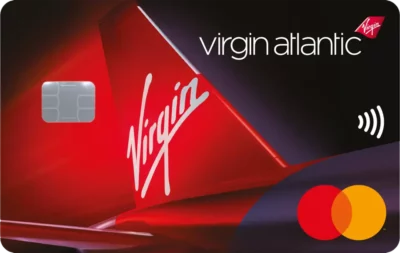
Sign-up bonus and earn rate:
- Get 3,000 Virgin Points after your first transaction
- Earn 0.75 Virgin Points per £1 spent
- Earn 1.5 points per £1 spent with Virgin Atlantic
Other information:
- Get a reward voucher worth 75,000 or 150,000 Virgin Points when you spend £20,000 in a year
- Use it towards a companion ticket when you buy a cash or reward flight
- Solo travellers can use it to upgrade a cash or reward flight by one cabin
- Vouchers are valid for two years
- Annual fee: Free
Representative 26.9% APR variable
You receive a bonus of 3,000 Virgin Points after your first purchase, however small.
You may want to consider applying for the Virgin Atlantic Reward+ Mastercard instead for its higher bonus. This comes with a £160 annual fee but has a sign-up bonus of 18,000 Virgin Points. You also receive a higher earning rate of 1.5 miles per £1 spent.
You cannot apply if you have had the free Virgin Atlantic Reward credit card in the previous six months. You are free to apply if you have any other Virgin Money credit card or the paid-for Virgin Atlantic Reward+ credit card.
When you spend £20,000 per year on the Virgin Atlantic Reward Mastercard, you will receive a reward voucher.
The voucher is worth:
75,000 Virgin Points if you have no status in Virgin Flying Club on the date you book
150,000 Virgin Points if you have Silver or Gold status in Virgin Flying Club on the date you book
The voucher is valid for two years and will get you:
A discount on a companion flight when you book a cash or reward flight at full price for yourself (taxes and charges need to be paid on the companion ticket)
A discount on a one category upgrade for yourself when you book a cash or reward flight
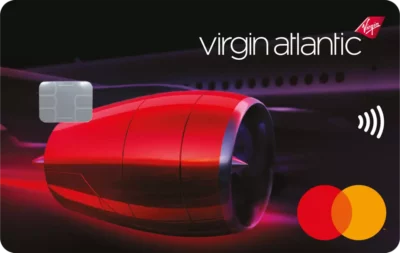
Sign-up bonus and earn rate:
- Get 18,000 Virgin Points after your first transaction
- Earn 1.5 Virgin Points per £1 spent
- Earn 3 points per £1 spent with Virgin Atlantic
Other information:
- Get a reward voucher worth 75,000 or 150,000 Virgin Points when you spend £10,000 in a year
- Use it towards a companion ticket when you buy a cash or reward flight
- Solo travellers can use it to upgrade a cash or reward flight by one cabin
- Vouchers are valid for two years
- Annual fee: £160
Representative 69.7% APR variable based on an assumed £1,200 credit limit and £160 annual fee. Interest rate on purchases 26.9% APR variable.
You receive a bonus of 18,000 Virgin Points after your first purchase, however small.
There are no restrictions on earning the bonus if you are accepted.
You cannot apply if you have had a Virgin Atlantic Reward+ credit card in the previous six months. You are free to apply if you have any other Virgin Money credit card or the free Virgin Atlantic Reward credit card.
When you spend £10,000 per year on the Virgin Atlantic Reward+ Mastercard, you will receive a reward voucher.
The voucher is worth:
75,000 Virgin Points if you have no status in Virgin Flying Club on the date you book
150,000 Virgin Points if you have Silver or Gold status in Virgin Flying Club on the date you book
The voucher is valid for two years and will get you:
A discount on a companion flight when you book a cash or reward flight at full price for yourself (taxes and charges need to be paid on the companion ticket)
A discount on a one category upgrade for yourself when you book a cash or reward flight
PS. If you are not a regular Head for Points visitor, why not sign up for our FREE weekly or daily newsletters? They are full of the latest Avios, airline, hotel and credit card points news and will help you travel better. To join our 70,000 free subscribers, click the button below or visit this page of the site to find out more. Thank you.
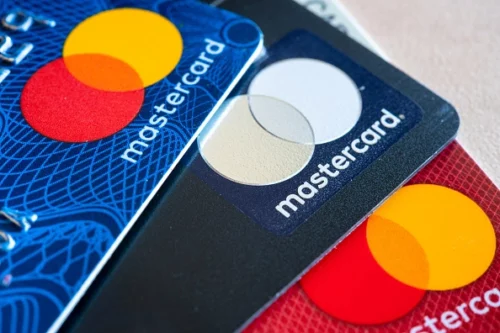
Want to earn more points from credit cards? – July 2025 update
If you are looking to apply for a new credit card, here are our top recommendations based on the current sign-up bonuses.
In 2022, Barclaycard launched two exciting new Barclaycard Avios Mastercard cards with a bonus of up to 25,000 Avios. You can apply here.
You qualify for the bonus on these cards even if you have a British Airways American Express card:

Barclaycard Avios Plus Mastercard
Get 25,000 Avios for signing up and an upgrade voucher at £10,000 Read our full review

Barclaycard Avios Mastercard
Get 5,000 Avios for signing up and an upgrade voucher at £20,000 Read our full review
You can see our full directory of all UK cards which earn airline or hotel points here. Here are the best of the other deals currently available.
SPECIAL OFFER: Until 15th July 2025, the sign-up bonus on the Marriott Bonvoy American Express Card is TRIPLED to 60,000 Marriott Bonvoy points. This would convert into 25,000 Avios or into 40 other airline schemes. It would also get you at least £300 of Marriott hotel stays based on our 0.5p per point low-end valuation. Other T&C apply and remain unchanged. Click here for our full card review and click here to apply.
SPECIAL OFFER: Until 14th August 2025, the sign-up bonus on the Hilton Honors Plus debit card is TRIPLED to 30,000 Hilton Honors points. You will also receive Gold Elite status in Hilton Honors for as long as you hold the card. Click here for our full card review and click here to apply.

American Express Preferred Rewards Gold Credit Card
Your best beginner’s card – 20,000 points, FREE for a year & four airport lounge passes Read our full review

British Airways American Express Premium Plus Card
30,000 Avios and the famous annual Companion Voucher voucher Read our full review

The Platinum Card from American Express
50,000 bonus points and great travel benefits – for a large fee Read our full review

Virgin Atlantic Reward+ Mastercard
18,000 bonus points and 1.5 points for every £1 you spend Read our full review
Earning miles and points from small business cards
If you are a sole trader or run a small company, you may also want to check out these offers:

The American Express Business Platinum Card
50,000 points when you sign-up and an annual £200 Amex Travel credit Read our full review

The American Express Business Gold Card
20,000 points sign-up bonus and FREE for a year Read our full review
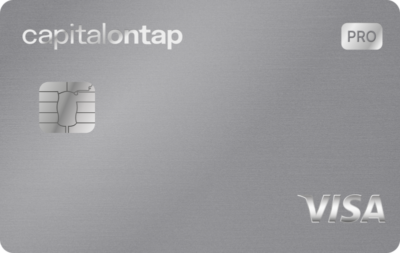
Capital on Tap Pro Visa
10,500 points (=10,500 Avios) plus good benefits Read our full review

Capital on Tap Visa
NO annual fee, NO FX fees and points worth 0.8 Avios per £1 Read our full review
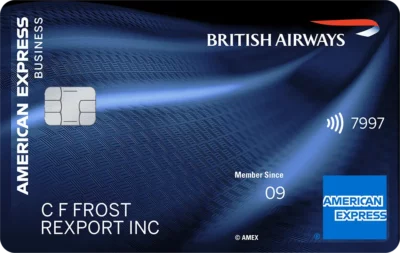
British Airways American Express Accelerating Business Card
30,000 Avios sign-up bonus – plus annual bonuses of up to 30,000 Avios Read our full review









Comments (60)